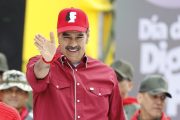
Senior delegations from Russia and China are meeting with top Venezuelan officials on Monday in Caracas to work on, as Bloomberg put it, “a plan to stem the brutal economic collapse” of their key Marxist ally in South America. The state-owned oil company, Petróleos de Venezuela, S.A., or PdVSA, not so coincidentally, happens to have a $949 million bond payment due on Monday, and those officials from Russia (which provided a lifeline to Maduro’s dictatorship a year ago by rescheduling some $3 billion of Maduro’s debt) were there to make sure they got their money. Investors, now called speculators, are owed an estimated $7 trillion by Maduro’s bankrupt regime.
According to Russia’s Finance Ministry spokesman Andrey Lavrov, the Russian team will “provide assistance to Venezuela in developing measures to manage the economy in a crisis situation.” Rather like asking an alcoholic for advice on how to kick the habit, remedies from Russia and China aren’t likely to help the average citizen.
To an American citizen, the situation facing the average Venezuelan is nearly incomprehensible. It is estimated that 90 percent of Maduro’s captives are living in poverty, with half of them living in “extreme poverty” (incomes not adequate to feed themselves). Most of them are now dependent upon government food boxes coming from Turkey, being paid for by shipping what’s left of Venezuela’s gold reserves to that country. Almost half the businesses in the country have closed thanks to government regulations, price fixing, and inflation, inflation that has turned the country’s currency into toilet paper. Malaria has resurfaced after being eradicated for years, and the homicide rate is the world’s second highest: More than five out of every 100 Venezuelans are murdered annually.
Those who can are escaping to Columbia, which now harbors some 600,000 former residents of Maduro’s paradise, with aid groups estimating that between 1.6 million and 2 million will leave the country this year, if they can obtain passports.
Oil production is less than half its level of just two years ago, thanks to incompetent Maduro cronies who replaced skilled workers during his “peoples’ revolution.”
Those Venezuelans remaining are so focused on surviving that there is little chance Maduro will be replaced in a coup generated by dissidents. He maintains a far-reaching intelligence network peopled by Cuban spies, and he controls the people through state-controlled media that has replaced privately owned newspapers. Through that media, according to the Washington Post, a “barrage of propaganda” depicts a country at ease and well fed. “State channels,” said the Post, “show footage of children in impeccable clothing, merrily returning to class,” when in reality most of them are underweight and wearing shoes with holes in their soles.
Maduro stays in power through cronyism and corruption among his top officials, notes the Post, a system “that has allowed Maduro to pay off the officials he needs to preserve his grip over the country.”
With “assistance” from his friends in Beijing and Moscow, Maduro is likely to remain in charge as long as it suits them. After all, the primary asset they seek is the enormous reserves of oil underneath that unhappy land, estimated at 300 billion barrels, the largest of any country on the planet.
As Monday’s meeting confirms, Maduro’s regime remains in power at their pleasure.
An Ivy League graduate and former investment advisor, Bob is a regular contributor to The New American magazine and blogs frequently at LightFromTheRight.com, primarily on economics and politics. He can be reached at [email protected].
Related articles:




